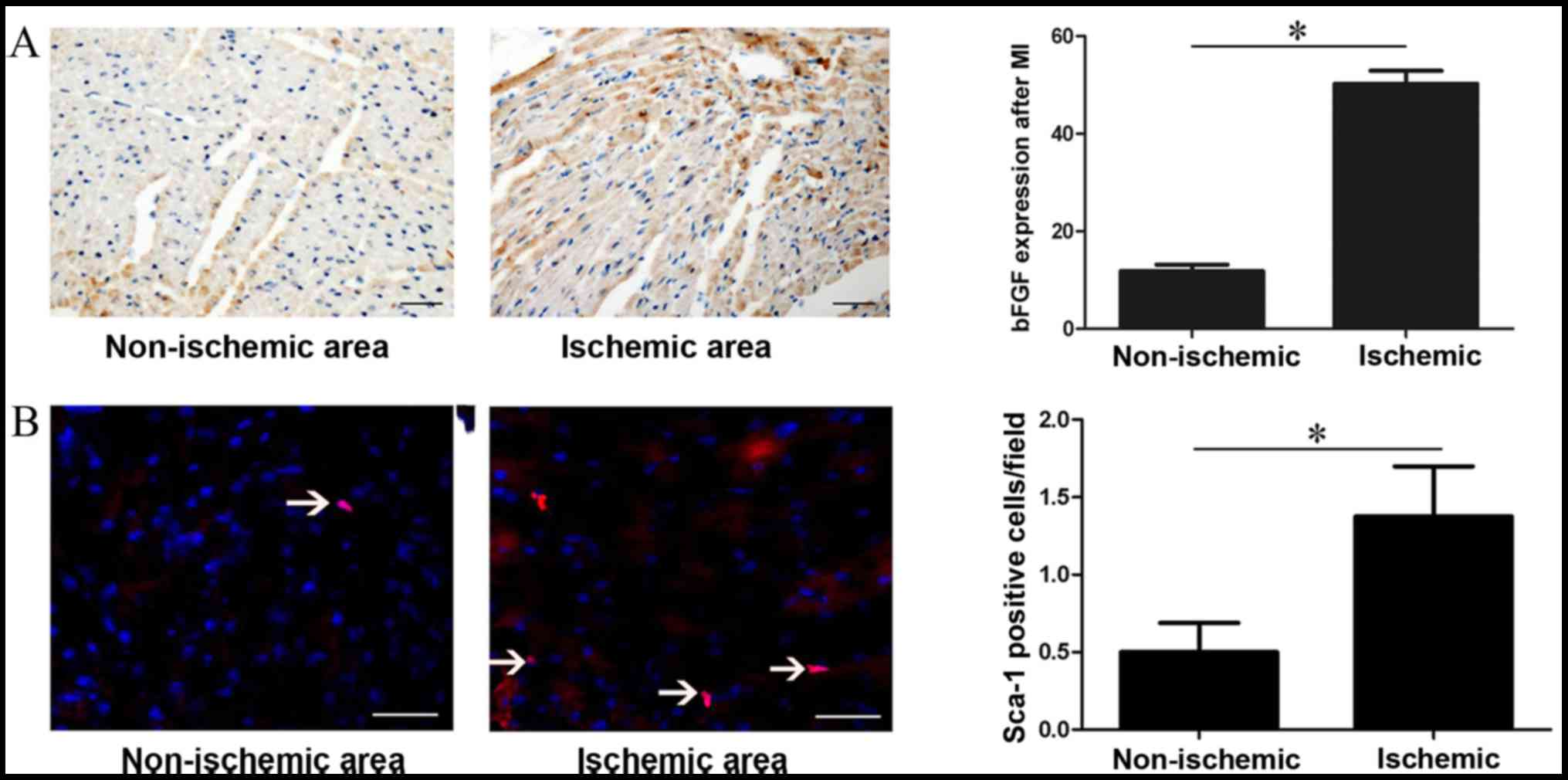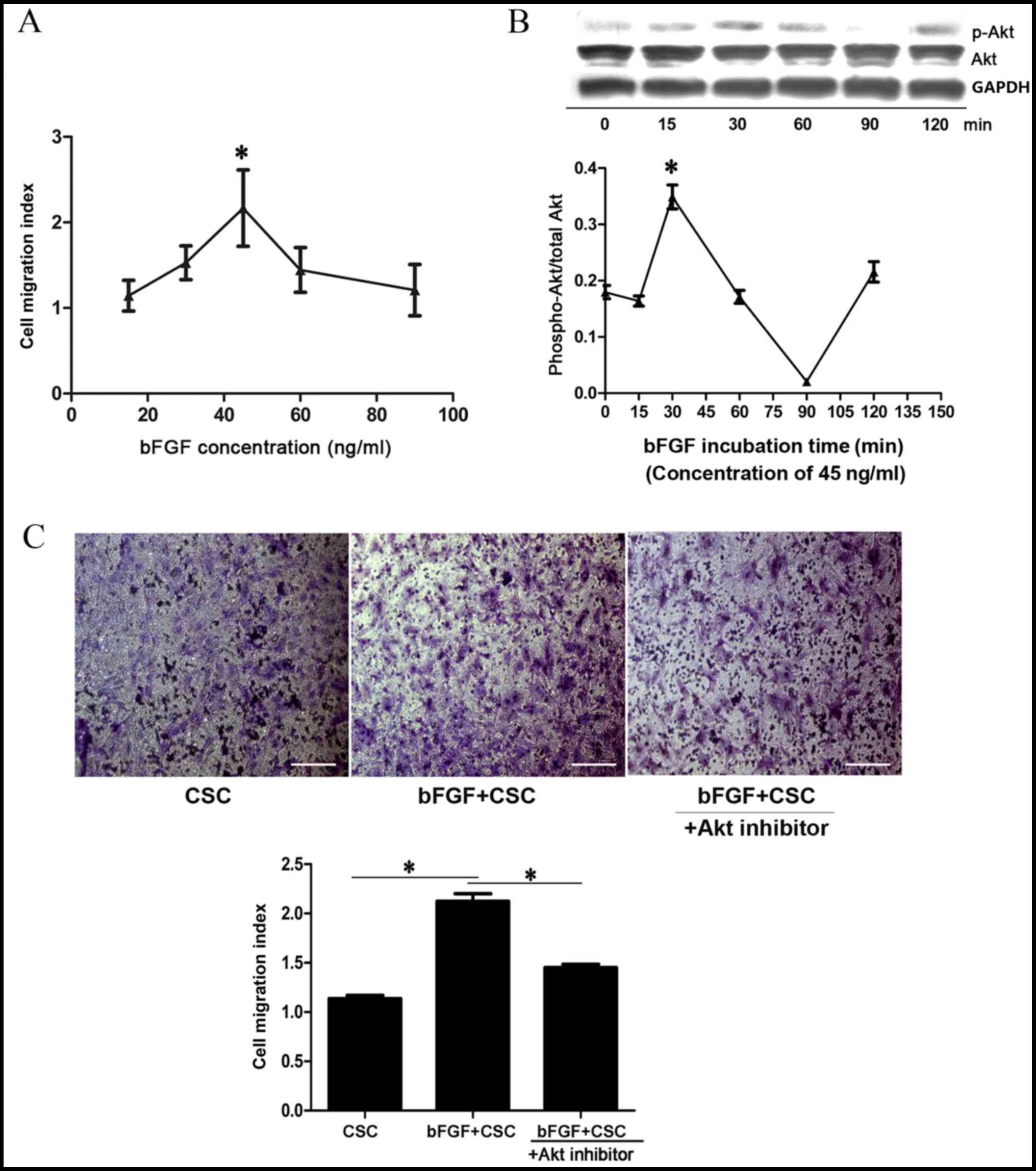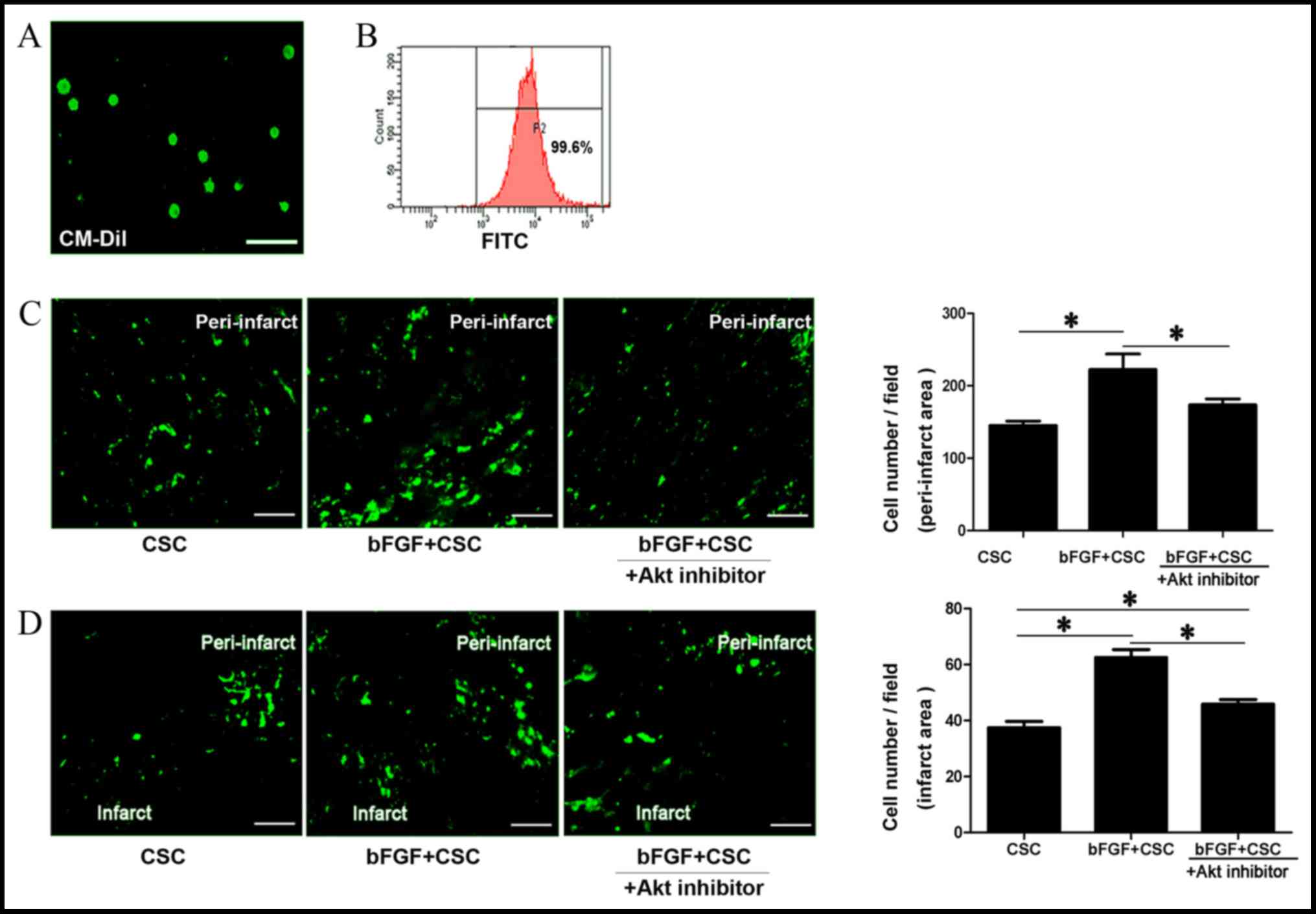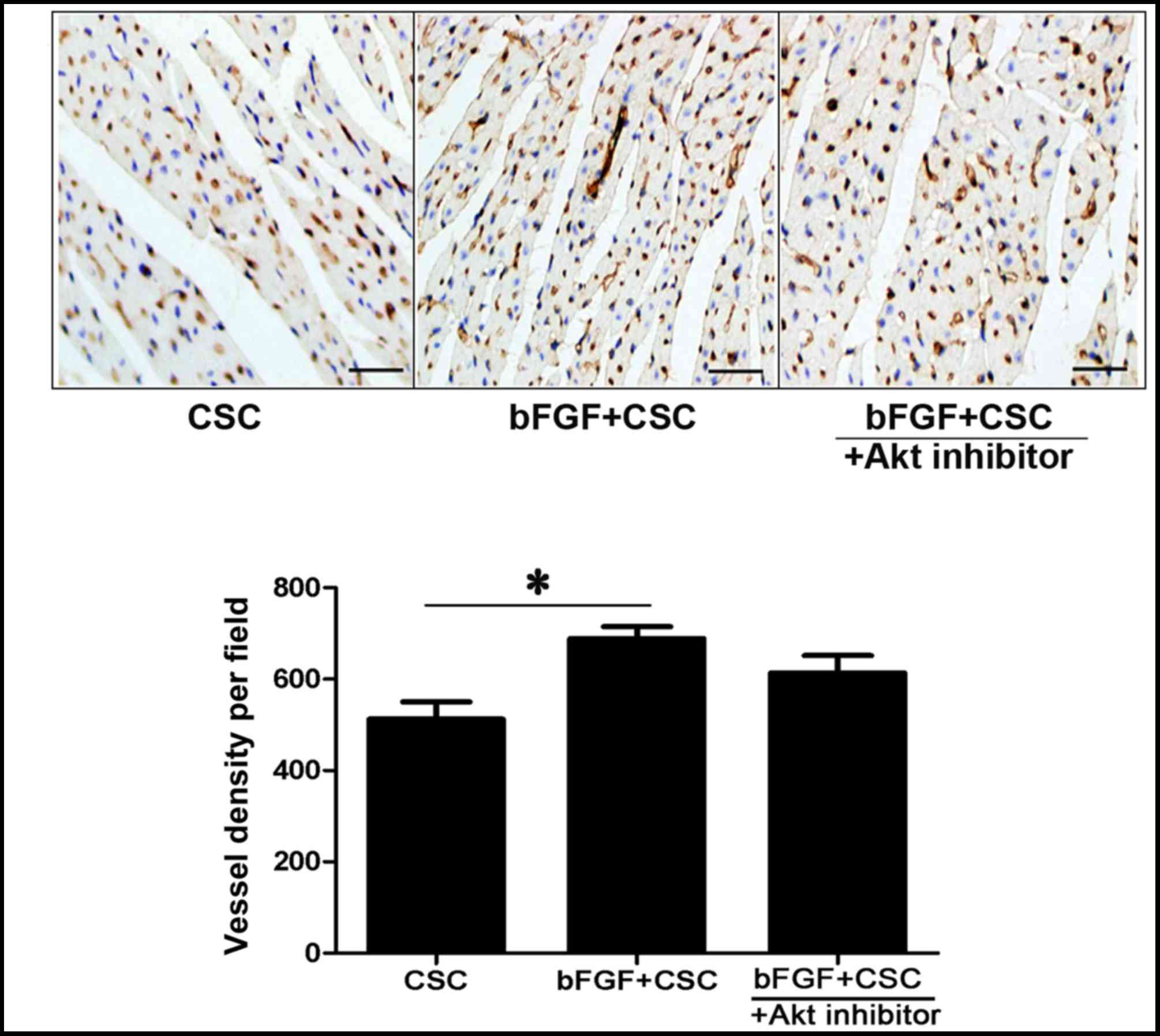|
1
|
Anderson KM: Discharge clinical
characteristics and 60-day readmission in patients hospitalized
with heart failure. J Cardiovasc Nurs. 29:232–241. 2014.PubMed/NCBI
|
|
2
|
Noseda M, Abreu-Paiva M and Schneider MD:
The Quest for the adult cardiac stem cell. Circ J. 79:1422–1430.
2015. View Article : Google Scholar : PubMed/NCBI
|
|
3
|
Mosna F, Annunziato F, Pizzolo G and
Krampera M: Cell therapy for cardiac regeneration after myocardial
infarct: Which cell is the best? Cardiovasc Hematol Agents Med
Chem. 8:227–243. 2010. View Article : Google Scholar : PubMed/NCBI
|
|
4
|
Nadal-Ginard B, Ellison GM and Torella D:
The cardiac stem cell compartment is indispensable for myocardial
cell homeostasis, repair and regeneration in the adult. Stem Cell
Res. 13:615–630. 2014. View Article : Google Scholar : PubMed/NCBI
|
|
5
|
Barile L, Messina E, Giacomello A and
Marbán E: Endogenous cardiac stem cells. Prog Cardiovasc Dis.
50:31–48. 2007. View Article : Google Scholar : PubMed/NCBI
|
|
6
|
Bergmann O, Bhardwaj RD, Bernard S, Zdunek
S, Barnabé-Heider F, Walsh S, Zupicich J, Alkass K, Buchholz BA,
Druid H, et al: Evidence for cardiomyocyte renewal in humans.
Science. 324:98–102. 2009. View Article : Google Scholar : PubMed/NCBI
|
|
7
|
Bearzi C, Rota M, Hosoda T, Tillmanns J,
Nascimbene A, De Angelis A, Yasuzawa-Amano S, Trofimova I, Siggins
RW, Lecapitaine N, et al: Human cardiac stem cells. Proc Natl Acad
Sci USA. 104:pp. 14068–14073. 2007; View Article : Google Scholar : PubMed/NCBI
|
|
8
|
Forte G, Minieri M, Cossa P, Antenucci D,
Sala M, Gnocchi V, Fiaccavento R, Carotenuto F, De Vito P, Baldini
PM, et al: Hepatocyte growth factor effects on mesenchymal stem
cells: Proliferation, migration, and differentiation. Stem Cells.
24:23–33. 2006. View Article : Google Scholar : PubMed/NCBI
|
|
9
|
Tang J, Wang J, Kong X, Yang J, Guo L,
Zheng F, Zhang L, Huang Y and Wan Y: Vascular endothelial growth
factor promotes cardiac stem cell migration via the PI3K/Akt
pathway. Exp Cell Res. 315:3521–3531. 2009. View Article : Google Scholar : PubMed/NCBI
|
|
10
|
Tang JM, Wang JN, Zhang L, Zheng F, Yang
JY, Kong X, Guo LY, Chen L, Huang YZ, Wan Y and Chen SY: VEGF/SDF-1
promotes cardiac stem cell mobilization and myocardial repair in
the infarcted heart. Cardiovasc Res. 91:402–411. 2011. View Article : Google Scholar : PubMed/NCBI
|
|
11
|
Unzek S, Zhang M, Mal N, Mills WR, Laurita
KR and Penn MS: SDF-1 recruits cardiac stem cell-like cells that
depolarize in vivo. Cell Transplant. 16:879–886. 2007. View Article : Google Scholar : PubMed/NCBI
|
|
12
|
Madonna R, Rokosh G, De Caterina R and
Bolli R: Hepatocyte growth factor/Met gene transfer in cardiac stem
cells-potential for cardiac repair. Basic Res Cardiol. 105:443–452.
2010. View Article : Google Scholar : PubMed/NCBI
|
|
13
|
Urbanek K, Rota M, Cascapera S, Bearzi C,
Nascimbene A, De Angelis A, Hosoda T, Chimenti S, Baker M, Limana
F, et al: Cardiac stem cells possess growth factor-receptor systems
that after activation regenerate the infarcted myocardium,
improving ventricular function and long-term survival. Circ Res.
97:663–673. 2005. View Article : Google Scholar : PubMed/NCBI
|
|
14
|
Takehara N, Tsutsumi Y, Tateishi K, Ogata
T, Tanaka H, Ueyama T, Takahashi T, Takamatsu T, Fukushima M,
Komeda M, et al: Controlled delivery of basic fibroblast growth
factor promotes human cardiosphere-derived cell engraftment to
enhance cardiac repair for chronic myocardial infarction. J Am Coll
Cardiol. 52:1858–1865. 2008. View Article : Google Scholar : PubMed/NCBI
|
|
15
|
Virag JA, Rolle ML, Reece J, Hardouin S,
Feigl EO and Murry CE: Fibroblast growth factor-2 regulates
myocardial infarct repair: Effects on cell proliferation, scar
contraction, and ventricular function. Am J Pathol. 171:1431–1440.
2007. View Article : Google Scholar : PubMed/NCBI
|
|
16
|
Tabata Y and Ikada Y: Vascularization
effect of basic fibroblast growth factor released from gelatin
hydrogels with different biodegradabilities. Biomaterials.
20:2169–2175. 1999. View Article : Google Scholar : PubMed/NCBI
|
|
17
|
Boodhwani M, Voisine P, Ruel M, Sodha NR,
Feng J, Xu SH, Bianchi C and Sellke FW: Comparison of vascular
endothelial growth factor and fibroblast growth factor-2 in a swine
model of endothelial dysfunction. Eur J Cardiothorac Surg.
33:645–650. 2008. View Article : Google Scholar : PubMed/NCBI
|
|
18
|
Cuevas P, Barrios V, Giménez-Gallego G,
Martinez-Coso V, Cuevas B, Benavides J, Garcia-Segovia J and
Asin-Cardiel E: Serum levels of basic fibroblast growth factor in
acute myocardial infarction. Eur J Med Res. 2:282–284.
1997.PubMed/NCBI
|
|
19
|
Fujita M, Ikemoto M, Kishishita M, Otani
H, Nohara R, Tanaka T, Tamaki S, Yamazato A and Sasayama S:
Elevated basic fibroblast growth factor in pericardial fluid of
patients with unstable angina. Circulation. 94:610–613. 1996.
View Article : Google Scholar : PubMed/NCBI
|
|
20
|
Anversa P, Rota M, Urbanek K, Hosoda T,
Sonnenblick EH, Leri A, Kajstura J and Bolli R: Myocardial aging-a
stem cell problem. Basic Res Cardiol. 100:482–493. 2005. View Article : Google Scholar : PubMed/NCBI
|
|
21
|
Linke A, Müller P, Nurzynska D, Casarsa C,
Torella D, Nascimbene A, Castaldo C, Cascapera S, Böhm M, Quaini F,
et al: Stem cells in the dog heart are self-renewing, clonogenic,
and multipotent and regenerate infarcted myocardium, improving
cardiac function. Proc Natl Acad Sci USA. 102:pp. 8966–8971. 2005;
View Article : Google Scholar : PubMed/NCBI
|
|
22
|
Urbanek K, Torella D, Sheikh F, De Angelis
A, Nurzynska D, Silvestri F, Beltrami CA, Bussani R, Beltrami AP,
Quaini F, et al: Myocardial regeneration by activation of
multipotent cardiac stem cells in ischemic heart failure. Proc Natl
Acad Sci USA. 102:pp. 8692–8697. 2005; View Article : Google Scholar : PubMed/NCBI
|
|
23
|
Smith RR, Barile L, Messina E and Marbán
E: Stem cells in the heart: What's the buzz all about?––Part 1:
Preclinical considerations. Heart Rhythm. 5:749–757. 2008.
View Article : Google Scholar : PubMed/NCBI
|
|
24
|
Wang X, Hu Q, Nakamura Y, Lee J, Zhang G,
From AH and Zhang J: The role of the sca-1+/CD31- cardiac
progenitor cell population in postinfarction left ventricular
remodeling. Stem Cells. 24:1779–1788. 2006. View Article : Google Scholar : PubMed/NCBI
|
|
25
|
Müller-Ehmsen J, Krausgrill B, Burst V,
Schenk K, Neisen UC, Fries JW, Fleischmann BK, Hescheler J and
Schwinger RHG: Effective engraftment but poor mid-term persistence
of mononuclear and mesenchymal bone marrow cells in acute and
chronic rat myocardial infarction. J Mol Cell Cardiol. 41:876–884.
2006. View Article : Google Scholar : PubMed/NCBI
|
|
26
|
Zhang M, Methot D, Poppa V, Fujio Y, Walsh
K and Murry CE: Cardiomyocyte grafting for cardiac repair: Graft
cell death and anti-death strategies. J Mol Cell Cardiol.
33:907–921. 2001. View Article : Google Scholar : PubMed/NCBI
|
|
27
|
Iwakura A, Fujita M, Kataoka K, Tambara K,
Sakakibara Y, Komeda M and Tabata Y: Intramyocardial sustained
delivery of basic fibroblast growth factor improves angiogenesis
and ventricular function in a rat infarct model. Heart Vessels.
18:93–99. 2000. View Article : Google Scholar
|
|
28
|
Kawasuji M, Nagamine H, Ikeda M,
Sakakibara N, Takemura H, Fujii S and Watanabe Y: Therapeutic
angiogenesis with intramyocardial administration of basic
fibroblast growth factor. Ann Thorac Surg. 69:1155–1161. 2000.
View Article : Google Scholar : PubMed/NCBI
|
|
29
|
Bougioukas I, Didilis V, Ypsilantis P,
Giatromanolaki A, Sivridis E, Lialiaris T, Mikroulis D, Simopoulos
C and Bougioukas G: Intramyocardial injection of low-dose basic
fibroblast growth factor or vascular endothelial growth factor
induces angiogenesis in the infarcted rabbit myocardium. Cardiovasc
Pathol. 16:63–68. 2007. View Article : Google Scholar : PubMed/NCBI
|
|
30
|
Fujio Y, Nguyen T, Wencker D, Kitsis RN
and Walsh K: Akt promotes survival of cardiomyocytes in vitro and
protects against ischemia-reperfusion injury in mouse heart.
Circulation. 101:660–667. 2000. View Article : Google Scholar : PubMed/NCBI
|
|
31
|
Nervi B, Link DC and DiPersio JF:
Cytokines and hematopoietic stem cell mobilization. J Cell Biochem.
99:690–705. 2006. View Article : Google Scholar : PubMed/NCBI
|
|
32
|
Asahara T, Takahashi T, Masuda H, Kalka C,
Chen D, Iwaguro H, Inai Y, Silver M and Isner JM: VEGF contributes
to postnatal neovascularization by mobilizing bone marrow-derived
endothelial progenitor cells. EMBO J. 18:3964–3972. 1999.
View Article : Google Scholar : PubMed/NCBI
|
|
33
|
Ceradini DJ, Kulkarni AR, Callaghan MJ,
Tepper OM, Bastidas N, Kleinman ME, Capla JM, Galiano RD, Levine JP
and Gurtner GC: Progenitor cell trafficking is regulated by hypoxic
gradients through HIF-1 induction of SDF-1. Nat Med. 10:858–864.
2004. View
Article : Google Scholar : PubMed/NCBI
|
|
34
|
Kucia M, Jankowski K, Reca R, Wysoczynski
M, Bandura L, Allendorf DJ, Zhang J, Ratajczak J and Ratajczak MZ:
CXCR4-SDF-1 signalling, locomotion, chemotaxis and adhesion. J Mol
Histol. 35:233–245. 2004. View Article : Google Scholar : PubMed/NCBI
|



















